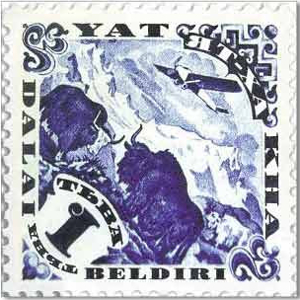
Aldyn-ool Takashovich Sevek (Tuvan : Алдын-ooл Севек, Russian : Алдын-оол Такашович Севек; 27 October 1963 – 11 September 2011) was a master Tuvan throat singer. [1]

Aldyn-ool Takashovich Sevek (Tuvan : Алдын-ooл Севек, Russian : Алдын-оол Такашович Севек; 27 October 1963 – 11 September 2011) was a master Tuvan throat singer. [1]
Sevek was from Mogur Aksi, a remote village in the Tuvan mountains. [2] [ unreliable source? ] He was an accomplished master of khöömei (Tuvan : хөөмей), especially The Dag (mountain) Kargyraa style, for which he is a household name in the world of throat singing. His unique style is instantly recognizable on recordings, and despite many attempts, no-one has been able to successfully reproduce his sound. [3] For a time, he performed with the group Yat-Kha. [1] Sevek won the Grand Prize at the International Symposium of Throat-Singing. [4]
Sevek died of Throat Cancer on 11 September 2011. [5] [6]

Overtone singing, also known as overtone chanting, harmonic singing, polyphonic overtone singing, or diphonic singing, is a set of singing techniques in which the vocalist manipulates the resonances of the vocal tract to arouse the perception of additional separate notes beyond the fundamental frequency that is being produced.

The Tuvans or Tyvans are a Turkic ethnic group indigenous to Siberia that live in Tuva, Mongolia, and China. They speak the Tuvan language, a Siberian Turkic language. In Mongolia, they are regarded as one of the Uriankhai peoples and thought to be Turkicized Mongols.
The igil is a two-stringed Tuvan musical instrument, played by bowing the strings. The neck and lute-shaped sound box are usually made of a solid piece of pine or larch. The top of the sound box may be covered with skin or a thin wooden plate. The strings, and those of the bow, are traditionally made of hair from a horse's tail, but may also be made of nylon. Like the morin khuur of Mongolia, the igil typically features a carved horse's head at the top of the neck above the tuning pegs, and both instruments are known as the horsehead fiddle.

Kongar-ool Borisovich Ondar was a master Soviet and Russian Tuvan throat singer and a member of the Great Khural of Tuva.
Tuva is a part of Russia, inhabited by a Turkic people. Tuvans are known abroad for khoomei (xöömej), a kind of overtone singing.

Huun-Huur-Tu are a music group from Tuva, a Russian federative republic situated on the Mongolia–Russia border. Their music includes throat singing, in which the singers sing both a note and its overtones, thus producing two or three notes simultaneously. The overtone may sound like a flute, whistle or bird, but is solely a product of the human voice.

Tuva or Tyva, officially the Republic of Tuva, is a republic of Russia. Tuva lies at the geographical center of Asia, in southern Siberia. The republic borders the federal subjects of the Altai Republic, Buryatia, Irkutsk Oblast, Khakassia, and Krasnoyarsk Krai, and shares an international border with Mongolia to the south. Tuva has a population of 336,651. Its capital city is Kyzyl, in which more than a third of the population reside.

Yat-Kha is a band from Tuva, led by vocalist/guitarist Albert Kuvezin. Their music is a mixture of Tuvan traditional music and rock, featuring Kuvezin's distinctive kargyraa throat singing style, the kanzat kargyraa.

Albert Budachievich Kuvezin is a Tuvan guitarist and throat singer.

Vihma is Värttinä's 7th album, released in 1998. It is primarily pop- and rock-influenced Finnish folk music. However, three tracks also include Tuvan throat singing.

Tyva Kyzy is an all-female folk ensemble performing Tuvan throat-singing, under the direction of Choduraa Tumat. It is the first and only women's group in Tuva that performs all styles of Tuvan throat-singing.

Chirgilchin, meaning "dance of the air in the heat of the day" or "miracle" in Tuvan, is a group of Tuvan musicians performing traditional Tuvan music. It was established in 1996.

Tuvan-Mongol throat singing, the main technique of which is known as khoomei, is a style of singing practiced by people in Tuva and Mongolia. It is noted for including overtone singing. In 2009, it was included in the Representative List of the Intangible Cultural Heritage of Humanity of UNESCO. The term hömey or kömey means 'throat' and 'larynx' in various Turkic languages.
Valentina Suzukei is one of the leading ethnomusicologists in the Tyva Republic (Tuva), Russia.

Kaigal-ool Kim-oolovich Khovalyg is a Tuvan throat singer and co-founder of the Tuvan music group Huun-Huur-Tu.

Sholban Valeryevich Kara-ool is a Russian politician of Tuvan ethnic origins. He was the Head of the Republic of Tuva, a Russian republic, from 2007 to 2021.

"Men – tyva men" is the regional anthem of the Republic of Tuva, a constituent republic of the Russian Federation. The music was composed by Kantomur Saryglar, and the lyrics were written by Okei Shanagash. It was officially adopted by the Great Khural of Tuva on 11 August 2011, replacing the previous anthem "Tooruktug Dolgai Tangdym".

Churguy-ool Namgaevich Khomushku was an officer in the Red Army and a recipient of the title Hero of the Soviet Union.

Dalai Beldiri is an album by the Tuvan band Yat-Kha. It was released internationally in 1999. The album title translates as "the confluence of the seas". The band supported the album with a North American tour.

Kuzhuget Sereyevich Shoigu, was a Soviet Tuvan politician, journalist, and writer who served as a secretary of the Tuvan Regional Committee of the Communist Party of the Soviet Union, first Deputy Chairman of the Council of Ministers of the Tuvan Autonomous Soviet Socialist Republic, and a deputy of the Supreme Soviet of the Tuvan ASSR. He was also the father of Sergei Shoigu and Larisa Shoigu.